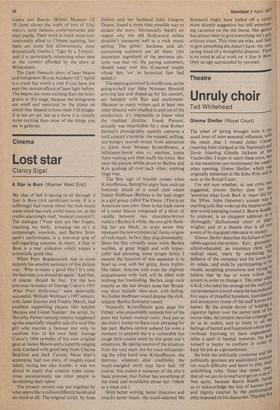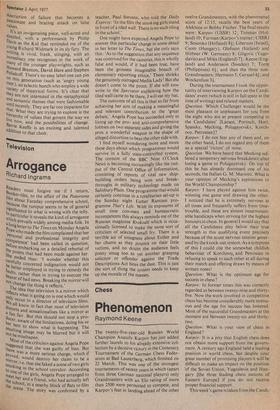Theatre
Unruly choir
Ted Whitehead
Gimme Shelter (Royal Court) The onset of spring brought with it 111Y usual bout of inter-seasonal influenza, with the result that I missed Julius Caesar (starring John Gielgud at the National) and Stevie (starring Glenda Jackson at the Vaudeville). I hope to catch these soon, but in the meantime can recommend the week 'S other opening, Gimme Shelter, which was originally presented at the Soho Poly and is now at the Royal Court. I'm not sure whether, as one critic has suggested, Ginune Shelter does for the 'seventies what Look Back in Anger did for the 'fifties. John Osborne's screamwas,a startling solo that woke up the theatre to the new world emerging round it. Barrie Keefie' by contrast, is an eloquent addition to a thoroughly ' disillusioned choir of PlaYwrights, and to a theatre that is all too aware of its marginal relevance to societY. Gimme Shelter describes the failure of tw° rebels-against-the-system. Key, grammar,: school-educated, art insurance clerk wit,' radical ideas, starts by exhibiting h's defiance of the company and his scorn for its values; and ends by participating in its rituals, accepting promotion and trying ,. t° believe that he has to work within trii; system in order to change it. The other rebe' is Kid, who takes his revenge on the staff of a comprehensive school where he has endure° five years of dreadful boredom, humiliatio° and anonymity (none of the staff knows his name). By the simple device of holding ,3 cigarette lighter over the petrol tank of h15 motor-bike, he compels them for a change t° do as he orders, and to listen to all the feelings of hatred and frustration which they (without knowing it) have engendered. After a spell in borstal, however, the 14•10° himself is happy to conform in order t keep his job as a groundsman. So both the politically conscious and the politically ignorant are assimilated withoL!t.. too much difficulty and learn to p lay the', unfulfilling roles. Does that mean, the°,' that all we can do is snarl and get on with It; Not quite, because Barrie Keeffe fore% us to acknowledge the loss of human lov and dignity exacted by the performa0e! ethic imposed on his characters. The play is description of failure that becomes a Passionate and bracing attack on false values.
It's an invigorating piece, well-acted and directed, with a performance by Philip °avis as the Kid that reminded me of the Ycifting Richard Widmark in its sly fury. The Writing is vivid, frank, stinging, with an Immediacy one recognises in the work of 111,,any of the younger playwrights, such as Howard Brenton, David Hare and Stephen Poliakoff. There's no easy label one can pin O n this generation (such as 'angry young then), an eclectic bunch who employ a wide v,_allery of theatrical forms. It's clear that incy are not interested in the metaphysical and semantic themes that were fashionable until recently. They are far too impatient for t,h.atWhat they are trying to explore is the
,n.terarchy of values that govern the way we live now, and the possibilities of change. Barrie Keeffe is an exciting and talented addition to that choir.







































 Previous page
Previous page